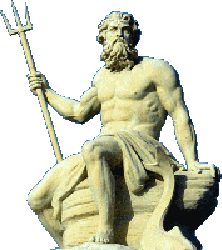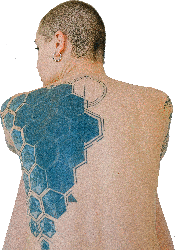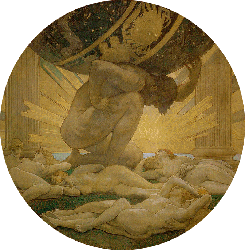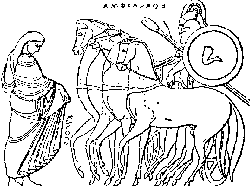WHO WERE THE ATLANTEANS?

EVENOR
According to Liddell & Scott, the name Evenor signifies "the joy of men" or, more pertinently, "well-manned, abounding in brave men" (the later normally being used as an epithet of communities). As such, Plato uses the name in little more than a generic sense to denote Evenor's procreation of Atlantis' royal and noble lineages.
There are a number of other Evenors in the Greek mythological corpus. Of these, the most significant is an Evenor (according to Butler's translation) or Evenus mentioned in the Iliad [2.681-694]: -
Other Evenors are the father of the suitor Leocritus in the Odyssey [2.242; 22.294], and the father of Agelaus, an associate of Theseus' son Acamas in Quintus Smyrnaeus' The Fall of Troy [4.365].
LEUCIPPE

In common with the name of her husband, Leucippe's designation has the feel of a generic, being explained as a female version of λεύκιππος, meaning "riding or driving white horses." Of the masculine version, H.J. Rose, noting that "a dozen mythological nobodies have the same name," explains it as: "[w]hite-horse man, i.e. nobleman, person who can afford to keep fine horses for racing, etc." As opposed to Evenor, whose name emphasies the quality of his descendants and, possibly, by extension the men under their command, Leucippe's stresses the nobility and wealth of the Atlantean leadership.
Slobodan Dušanić suggests that Leucippe's name derives from the noble white horse from the chariot of the soul in the Phaedrus [253d]: "[t]he horse that stands at the right hand is upright and has clean limbs; he carries his neck high, has an aquiline nose, is white in color, and has dark eyes; he is a friend of honor joined with temperance and modesty, and a follower of true glory; he needs no whip, but is guided only by the word of command and by reason." The change in gender is due to unrighteousness (cf Tim. 90e-91a: "[a]ccording to the probable account, all those creatures generated as men who proved themselves cowardly and spent their lives in wrong-doing were transformed, at their second incarnation, into women. And it was for this reason that the gods at that time contrived the love of sexual intercourse by constructing an animate creature of one kind in us men, and of another kind in women; and they made these severally in the following fashion"), which Dušanić puts down to "ambition."
Several personages also bear the name Leucippe. The Homeric Hymn to Demeter [418] has a Leucippe among the nymphs in the train of Persephone when she was carried off by Hades, which is reiterated by Pausanias [4.30.4]. Another Leucippe is listed among the Minyades stricken by Dionysiac madness in Aelian's Various Histories [3.42]. A further Leucippe is the mother of the Argonaut Iphiclus. Two more characters by this name appear in sources related to the Trojan saga. The Achaean seer Calchas is given a sister by this name by Hyginus [Fabulae 190], a priestess of Apollo, with the same author making a Leucippe the paternal grandmother of Priam [ibid. 250]. In contrast, pseudo-Apollodorus [3.12.3] notes a tradition which makes Leucippe the wife, rather than the mother, of Priam's father Laomedon. Additionally, a Leucippe is the heroine of the 4th century romance The Adventures of Leucippe and Cleitophon, written by Achilles Tatius.
MELANIPPE
Furthermore, Dušanić explains the genealogy as being based on that of Melanippe ("black horse"), of whom Leucippe acts as a cipher. Melanippe was the daughter of Aeolus and Hippo, daughter of the noble centaur Chiron, who was the mother (else grandmother through Arne) by Poseidon of Aeolus and Boeotus. Dušanić duly notes connections between the children of Cleito and names from Thessaly ("Aeolia") and Boeotian Thebes, before developing a case for reading the older twins as Athenian villains and their younger counterparts as Syracusans.
LEUCIPPUS
Most of Rose's "nobodies" called Leucippus are the sons of more famous fathers. These fathers include Heracles, Poemander and Oenomaus. The most significant Leucippus is the son of Perieres and Gorgophone of Messenia and brother of Aphareus. He is named among the huntsmen who pursued the Calydonian boar. His daughters were abducted by Castor and Polydeuces, princes of Sparta (likely one of the myths reflecting the Archaic Era state of affairs between the two states), whilst the town of Leuctra in Boeotia is said to derive its name from him. Other men with this name are kings of Sicyon and Naxos, and the leader of a Lesbian colony on Rhodes, as well as an Achaean who migrated to the western colony of Metapontum.

CLEITO

Cleito's name is, like those of her parents, descriptive, perhaps deriving from Poseidon's secreting her on the eyot focus of the city of Atlantis: the verb κλείω can mean "to confine" or "to close" - perhaps worth contrasting with the Odyssey's daughter of Atlas Calypso, "the concealer." Alternatively, her name may come from κλέος, meaning "famous, renowned, illustrious," itself etymologically connected to another κλείω, meaning "to celebrate." The latter derivation renders Cleito's name a relative of that of Clymene, who is given as the mother of the Titan Atlas in the majority of sources.
A Cleito appears as the mother of a Maeonian warrior Hellus in The Fall of Troy [11.71]: -
According to Dušanić, the three ancestral figures in the Critias represent a transparent allusion to contemporary events: -
ATLAS
And to all of them he gave names, giving to him that was eldest and king the name after which the whole island was called and the sea spoken of as the Atlantic, because the first king who then reigned had the name of Atlas. [Critias 114a].

By far the most famous of the names included in Plato's list of ten brothers is that of Atlas, who appears elsewhere in Greek myth as the name of a Titan charged with holding up the heavens and/or the earth. The name's origins are somewhat obscure, though are most commonly connected to the verb τλάω, which means "to bear, suffer, undergo" and "to endure, be patient." In his role as axis mundi, Atlas appears in Hesiod's Theogony, where he is situated in front of the gates of Tartarus [744-750], and/or in the west "before the clear-voiced Hesperides" [517-520]. As per Dimitri Nakassis' investigation into the development of a bipolar worldview from a unipolar system, and evidenced by the difference between the two passages from the Theogony, Atlas later came to be associated with the west in particular, being located in north western Africa where the Atlas Mountains still bear his name. It is in this region that people termed Atlantians or Atlantes are located by Herodotus and Diodorus Siculus, and can thus be regarded as a likely wellspring for Plato's development of the island empire dispatching forces from the west to threaten the Greek world and menace Egypt.
Atlas appears in the context of a description of his daughter Calypso's island home of Ogygia, where Odysseus is currently located, in Homer's Odyssey [1.51-54]: -

A late tradition makes Atlas the leader of the Titans during what would appear to be a second Titanomachy, taking the form of an uprising against the rule of Zeus instigated to some extent by Hera, during which Atlas received his assignment as axis mundi as a punishment [Hyginus, Fabulae 150]. The notion of Atlas and the other sons of Iapetus as rebels is gleaned from the work of the Corinthian poet Eumelus by Martin L. West, and the family's enmity towards the Olympians can be inferred from references to Atlas' brothers Menoetius, described as "outrageous," in the Theogony [514-516], for which Zeus "struck him with a lurid thunderbolt and sent him down to Erebus because of his mad presumption and exceeding pride," and the cunning Prometheus, chained to a rock in the Caucasus by Zeus for teaching humanity the secret of fire.
Later material tends to rationalise Atlas, holding that he was a king in north western Africa famous for his knowledge of astronomy. That such notions were available to Plato is highly likely: a fragment from the work of the poet Polyidus, whose work straddles the fifth and fourth centuries BC, is summarised thus: -
Atlas' mastery of astronomy was based on the above comment from the Odyssey [1.52]. Based on this, Pausanias has Atlas, here located in Boeotia, "[sitting] and [meditating] deeply upon hell and heaven, as Homer says of him" [9.20.3]. Interestingly, the Hittite Song of Ullikummi, Atlas' Hittite counterpart Upelluri or Ubelluris is too absorbed by his meditations to notice the additional weight of the gigantic stone monster Ullikummi, sired by the deposed Kumarbi as an enemy of the storm god Teššub, when Kumarbi secreted him on Upelluri's shoulder.
Otherwise, Atlas is of genealogical interest: he sired a host of daughters, mainly grouped into two classes of nymphs, the Pleiades and Hyades. The names of the Pleiades are established as early as the 7th or 6th century, when all seven appear in a fragment of the Astronomia, a work attributed to Hesiod, preserved as a scholiast on Pindar. Hellanicus of Lesbos wrote the Atlantis or Atlantias, which is widely believed to be an account of the Pleiades (and other descendants of Atlas) and their offspring. Hellanicus is a likely source for pseudo-Apollodorus, who places the Pleiades' origins in Arcadia [3.10.1]. The tragedian Aeschylus also regards the Pleiades as daughters of Atlas [F 172].
The Pleiades are intrinsically linked with another group of nymphs, the Hyades, whose parentage is only established, at least in the text which have survived, in Roman times, though their connection with Atlas would surely have dated to a much earlier period. They were said to have died from grief over the death of their brother Hyas (Atlas' only known son). Another fragment from the Astronomia names them as "Phaesyle and rich-crowned Cleea and lovely Phaio and long-robed Eudora."
Most importantly of all given our focus on the far western edges of the Greeks' known world, Atlas was also claimed (in opposition to Nyx and Phorcys) as the father of the Hesperides, guardians of the golden apples of the gods. The tradition which made them daughters of Atlas was already current by the 5th century, with the mythographer Pherecydes mentioning the connection [Pseudo-Hyginus, Astronomica 2.3]. One of their number was Erytheia, whose son was Eurytion, a herdsman who lived on the island also named Erytheia. By Plato's day, this island was identified with Gadeira. Strabo, quoting the epic poet Stesichorus' Geryoneis, states [3.2.11]: -
Other daughters of Atlas included Calypso, who appears in the Odyssey as Odysseus' besotted jailer. Like Atlantis, she belongs in the far west [5.270-281], despite later claims placing her in regions known to the ancients, especially on the Mediterranean island of Gozo by Malta. Also mentioned in the Odyssey is Maera, who appears in the roll-call of heroines in Hades [11.365]. She was the wife of Tegeates, an Arcadian ruler and her connection to Atlas is mentioned by Pausanias [8.48.6]. Additionally, Dione, the wife of Tantalus is made a daughter of Atlas by Ovid [Metamorphoses 6.172] and pseudo-Hyginus [Fabulae 83]. Dione is also the name of the mother of Aphrodite in the Iliad [5.370]. The name is a feminine version of Zeus, and this Titaness was associated with the king of the gods at his most important oracle at Dodona.
Herodotus also knows of a river called Atlas in the Balkans, running north from Mount Haemus and flowing into the Danube ("Ister") [4.49].
Lastly, it is worth noting another usage of Atlas from Plato's dialogues, in this case a quote from the Phaedo [99bc], which concerns the constructions of Plato's philosophical forebears: -
EUMELUS/GADEIRUS

Whilst the name of Atlas points to north west Africa, the "native" - actually Phoenician-derived - designation of Atlas' twin Gadeirus, is explicitly associated with the region of Gades, modern Cádiz in Spain, to the north west of Gibraltar, which would thus be the northern Pillar of Heracles specified by Plato. The names are derived from terms for sheep or goats (Greek: μῆλον; Phoenician: gd', jady; cf. Hebrew: גּדי; גּדיּה). The actual origin of the toponym Gades was more likely from Jdar ("to enclose" - cf. Cleito) or a cognate of the Ugaritic word gdrt ("[sheep-]fold"; cf. Hebrew גּדור; גּדר, "Gedor").
Eumelus, to give this character his rendered Greek name, shares his name with a Corinthian statesman and epic poet, to whom were ascribed the Corinthiaca, a cycle of poems dealing with the mythological history of the city, among other works. There are also a number of mythological figures bearing this name. Of them, the most significant, was Eumelus the son of Admetus and Alcestis, who led a contingent of Magnesians to Troy, and who was famed for his horsemanship: a damaged chariot cost him his chance of victory in the chariot race at Patroclus' funeral games, whilst a chariot accident also claimed the life of Antheias, son of another Eumelus who was associated with the culture-bearer Triptolemus, an important figure in the Eleusinian cycle of myths (it is worth considering the similarities between Antheias' fate and that of Phaethon), who is mentioned by Pausanias [7.18.2-3]: -
Others include a suitor of Penelope and the father of three daughters - Agrom, Byssa and Meropis - from Meropis in Cos, whose exclusive worship of Gaia and denigration of the other gods garnered the ire of Athena, Artemis and Hermes, who turned them into birds. Unhappy with this turn of events, Eumelus excoriated Hermes, whereupon the god turned him into a raven. Another Eumelus also had transforming children. This was the son of Eugnotus of Thebes, a worshipper of Apollo. He struck his son Botres for a violation of sacrificial ritual, leaving him mortally wounded, though Apollo took pity on Eumelus and his family by transforming Botres into a bee-eater. Additionally, a Eumelus is listed among the companions of Aeneas.
With regards to his name, it is perhaps worth introducing Diodorus' rationalising account of Atlas' career [4.27.1-2]: -
That Atlas' and Hesperus' "sheep" could be mistaken for apples is due to the homonymity between the words μῆλον (signifying a "sheep" or "goat," or "herds") and μῆλον (meaning "apple"). In this respect, Plato's choice of the name Eumelus as a twin of Atlas brings to mind allusions to the golden apples of the Hesperides and casts Eumelus in the role played by one "Hesperus" in the above quote from Diodorus.
THE OTHER EIGHT
AMPHERES
The name Ampheres is another descriptive name, meaning "fitted" or "joined on both sides" (Christopher Gill renders it: "well-fitted on both sides, well-built"). Liddell and Scott note its use by Euripides in relation to dwellings, funeral pyres and, most tellingly, ships: -
Given that the action in Euripides' Cyclops takes place on Polyphemus' island, described in idyllic terms by Homer [Odyssey 9.122-124; 131-139], we have another allusion to the mystical west, as well as a reiteration of Atlantis as a sea power.

Slobodan Dušanić compares the name (which he translates as "Boatman") with that of the seer Amphiaraus, and suggests that Ampheres, along with Atlas, represents a "quasi-Boeotian" name in the "Boeotus' group," composed of the elder twins who represent the villanous Athenians, in contrast with the younger twins, Dušanić's "Aeolus' group," including "the Thessalian names Eumelus and Euaemon," who represent nefarious elements in Syracuse.
Amphiaraus was a participant in the Calydonian Boar Hunt and a significant fighter, who was swallowed up into the earth at the instigation of Zeus whilst being chased by Periclymenus, a son of Poseidon. Amphiaraus had earlier doomed Athena's favourite Tydeus by encouraging him to devour the brain of Melanippus, thus causing the goddess to withdraw her intended conference of immortality in disgust.
EVAEMON
Evaemon or Euaemon is interpreted as "well-skilled," deriving from the prefix εὐ, denoting "good," and αἵμων ("skilful in a thing"), equivalent to δαήμων ("knowing, experienced in a thing"). It is, however, worth noting that the form αἷμα can mean "bloody," which suggests another double entendre, describing both the Atlanteans' skill in building and navigation as well as, in their overbearing phase, the nature of their conquests. Dušanić suggests "aristocrat" as a meaning, while Christopher Gill gives "of good blood."
There are two mythical personages who bear the name. The first is a son of Lycaon of Arcadia. The second, mentioned in the Iliad, is the father of another Eurypylus, who led a contingent of forty "black ships" to Troy [2.734-737]: -
Eurypylus, in his guise as king of Cyrene, was also associated with the Argonauts and, tellingly, a figure by this name is used as a disguise by Triton, the guardian of Lake Tritonis. Whether this is Eurypylus the son of Evaemon is unclear: it is much more likely that Eurypylus the son of Poseidon by the Pleiad Celaeno is intended.
MNESEUS
Mneseus' name is derived from μνήμων, μνάομαι, meaning "mindful" or used in reference to the possession a good memory: Christopher Gill gives the translation "the one who remembers." Slobodan Dušanić proposes an meaning of "revengeful," and places this concept in contrast to Timotheus and Dion's "placability in both foreign and home policy," which "corresponded to Plato's ideas."
AUTOCHTHON
The name Autochthon simply signifies one who has "sprung from the land itself," which would refer to the Atlanteans' origins on the island. Intriguingly, the term is often used for the Athenians, who boasted that, unlike the neighbouring Dorian and Boeotian peoples, they inhabited their original territory, a state of affairs invoked by Plato in, for example, his Menexenus [237bc]: -
According to Dušanić, "[a]utochthony was a political slogan of the radicals in Athens and of the anti-Athenians in Syracuse; on the philosophical level, it may connote materialism."
ELASIPPUS
The name of Elasippus is closely related to that of Leucippe, and signifies "horse-driving, horse-riding, knightly." Additionally, a possible derivation from the word ἔλασις, which can mean "a march, expedition," suggests militaristic undertones pertinent to the story of the Atlanteans' expansionism.
Another Elasippus appears in Quintus Smyrnaeus' The Fall of Troy [1.300]: -
This Elasippus is a son of Haemon, himself the son of the Theban potentate Creon. Elasippus has a brother, Maeon, who is mentioned in the Iliad [4.394].
Slobodan Dušanić avers that "Elasippus, an - ιππος anthroponym, fits well into a Poseidonic genealogy" and notes that "Melanippe's lineage contains an Hippotes [the father of the wind-keeper Aeolus in the Odyssey] and an Hippe." Elasippus "seems to bear a name paraphrasing the name of the politician Hegesippus, the proposer of the sacrilegious Attico-Phocian alliance in 356, Chabrias' personal enemy and a complete radical," stating that: "[t]he first parts of the two names are almost synonymous." Hegesippus was an implacable enemy of Philip of Macedon, alongside his brother Hegesander, Timarchus and the philosopher Demosthenes, and his machinations, especially the hard line taken during an embassy to Philip, had disastrous consequences for the Greeks: in 342, "Philip adopted a more aggressive policy towards Greece, his proposal of a common peace having failed through Athenian intransigence, provoked by Hegesippus."
MESTOR
According to the philologist Adrian Room, Mestor means "counsellor" (Christopher Gill gives "adviser"), and is derived from μέδομαι.
In addition to the prince of Atlantis, three other people bearing this name make brief appearances in the Greek mythological corpus: -
Slobodan Dušanić proposes an origin of the name from μήστωρ ὰϋτῆς, "Author of the battle-din" [Iliad 4.328], and compares Mestor to the Sicilian Philistus. Philistus was a historian and supporter of the Dionysii. He was exiled in the 380s after contracting a marriage alliance with Dionysius the Elder's brother Leptines without the consent of the tyrant, but returned to Syracuse having been recalled by Dionysius the Younger, emerging as the nemesis of Plato and Dion. Philistus died by his own hand having been bested by Dion's invasion fleet in 356 BC.
AZAES
Azaes' name is a negative of ζαής, "strong-blowing, stormy," reflecting the ideal conditions of Atlantis' south shore, "sheltered from the Northern blasts" [Crit. 118b]. An alternative derivation, from ἀζάνω, appears unlikely given Atlantis' eventual watery fate. Christopher Gill prefers a rendering "parched, dark-skinned?" which may suggest a potential association with the Homeric Ethiopes.
Slobodan Dušanić, deriving the name from ἄζα, "heat (of ambition)," notes the similarity of the name Azaes and that of the Attic deme Azenia, and suggests that, in developing this character, Plato had in mind Aristophon of Azenia, the leader of the "radical" Athenian faction oppugnant towards Plato and his allies during the mid-4th century. Aristophon of Azenia emerged towards the end of the Peloponnesian War, as an ambassador to Sparta on behalf of the Four Hundred in 412 BC (Thucydides 8.86.9), and thereafter enjoyed a long career. Plato's ally Timotheus was convicted of having accepted bribes from the Chians and Rhodians based on Aristophon's assertions (cf Crit. 119c). The reality behind the impeachment of Timotheus and Iphicrates lay in Chares' assertion that their failure to support his rash action at Embata had stymied Athens' attempts to reassert control over Chios [Cornelius Nepos 13.3 - note Cornelius suggests that the battle was against Samos]. Whilst Iphicrates was acquitted, Timotheus' conviction forced him to seek exile, where he died a few years later.
In his Laws [1.638b], Plato says: "we find the Syracusans subjugating the Locrians, who are reputed to have been the best-governed of the peoples in that part of the world: and the Athenians the Ceians." Dušanić notes that "the defection of Ceos in 363/2 led to the confrontation of Chabrias and Aristophon, the defection of Rhodes, Chios, Byzantium and Cos in 357 to that of Timotheus and Aristophon" and, as such, can be seen as the spark of the Social War. Plato's parallel between the Syracusan conquest of Locri (perhaps Dionysius II's power-grab in the city) - the home of his Timaeus - with Athens' actions against Ceos further associates the "radical" faction in Athens with Dionysius - and, by extension, tyranny.
DIAPREPES
Diaprepes means "eminent, distinguished, illustrious," or, as per Christopher Gill, "magnificent," which reflects the fame and luxury garnered by Atlantis during its period of existence. Slobodan Dušanić notes that, of all the names included among the sons of Poseidon in Plato's account, only Diaprepes, along with Azaes, have no mythological counterpart. Furthermore, he suspects that Diaprepes was explicitly based upon Plato's erstwhile charge-turned-implacable enemy Dionysius the Younger, who, he notes, was addressed as ὦ θαυμάσιε, i.e. "Sir Magnificent," in the possibly spurious Third Letter.
Finally, whilst suggesting a number of correlations between the personages of the genealogy and his contemporaries, one particularly notorious Athenian is missing: "it is interesting to notice that any allusion to Chares is absent, at least according to our interpretation of the stemma," whilst discounting several: "[w]ith regard to Chares' conspicuous role in the events of 357-355, an allusion to him under the names of Ampheres, Mneseus (or Mestor) would seem too vague."
